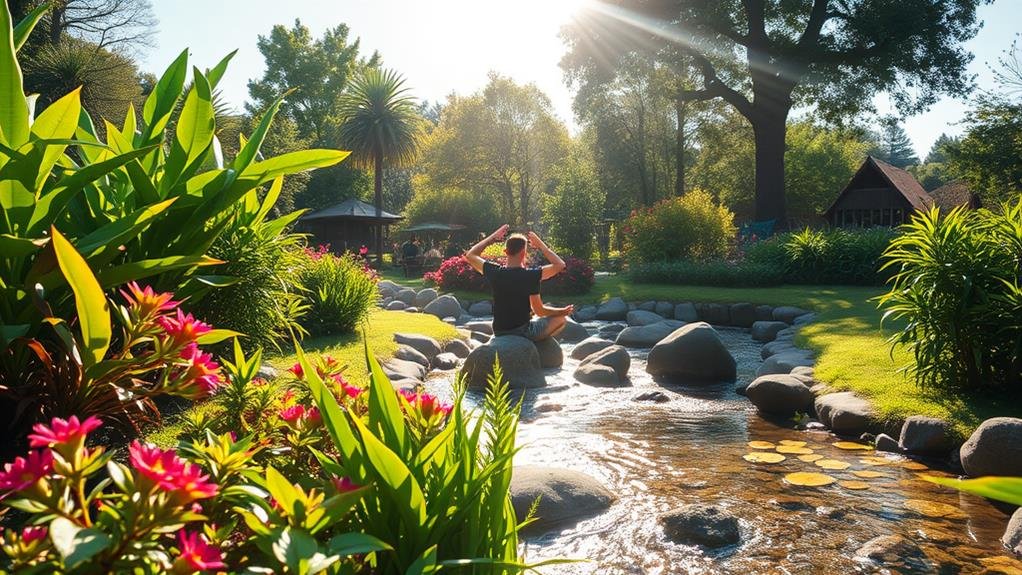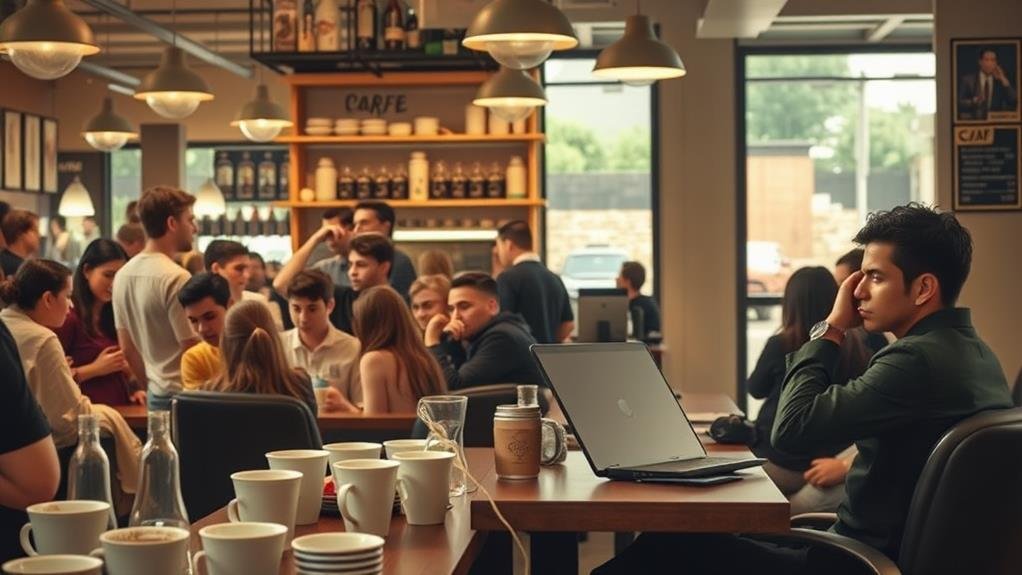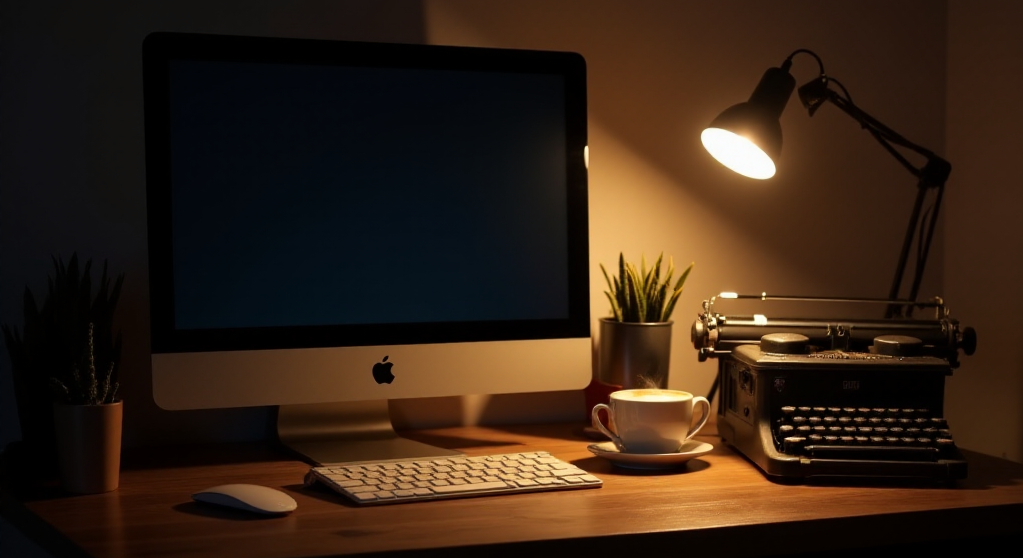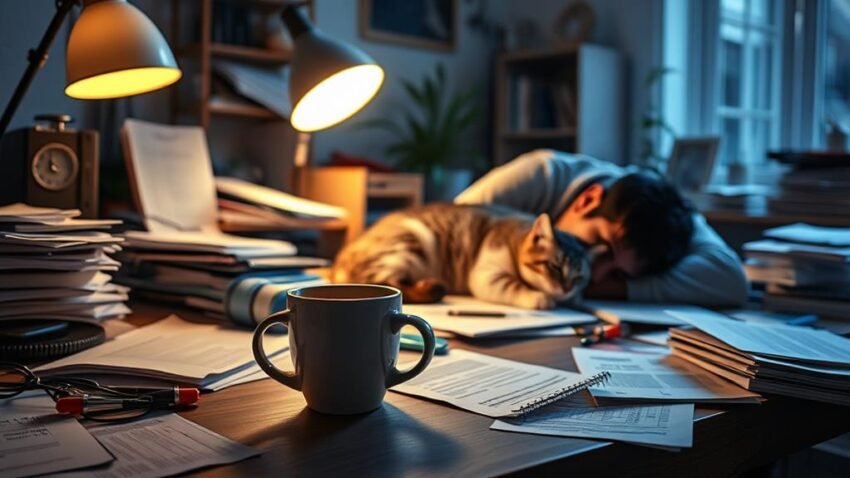You might be surprised to learn that life without coffee can greatly improve your overall well-being. By giving up caffeine, you may experience reduced anxiety, better sleep quality, and even healthier teeth. While it's true that quitting coffee can lead to withdrawal symptoms like headaches and fatigue, managing these with proper hydration and balanced meals can be a game-changer. But what does this journey really look like? How do you replace the energy boost that coffee provides? The answers to these questions could transform your daily life in ways you've never imagined.
Health Benefits of Caffeine-Free Living

Embracing a caffeine-free lifestyle can greatly impact your health in several positive ways. One of the most noticeable benefits is the reduction in anxiety, nervousness, heart palpitations, and panic attacks. Without caffeine, you're less likely to experience these symptoms, leading to a more calm and stable emotional state. Additionally, many people find that decaf coffee production allows them to enjoy the rich flavors of coffee without the jittery side effects of caffeine.
Another significant advantage is improved sleep quality. Caffeine can disrupt sleep patterns and make it harder to fall asleep. By eliminating it from your diet, you may find that you sleep better and fall asleep quicker. This better sleep quality can have a cascading effect on overall health, improving mood and energy levels.
A caffeine-free lifestyle also enhances the absorption of essential nutrients like calcium, iron, and B vitamins. These nutrients are pivotal for maintaining strong bones, healthy red blood cells, and efficient metabolism. Additionally, avoiding caffeine can promote healthier teeth by reducing the staining and enamel discoloration often caused by coffee and tea consumption.
For women, a caffeine-free lifestyle may help balance hormone levels. Caffeine can alter estrogen levels and worsen menopause symptoms, so avoiding it might provide relief. By choosing a caffeine-free lifestyle, you can enjoy these health benefits and potentially live a healthier life.
Managing Withdrawal Symptoms
When quitting coffee, I quickly realized that handling headaches and managing fatigue were among the most challenging withdrawal symptoms. This experience made me appreciate the complexity of flavors found in different coffee blends, such as the rich and complex profile of Nantucket Blend Coffee. To alleviate these issues, I found that eating foods high in healthy fats and carbohydrates helped notably. Additionally, incorporating restorative yoga and guided meditations into my routine provided relief from headaches and afternoon slumps.
Handling Headaches
Quitting coffee can be challenging, and one of the most immediate obstacles is handling headaches. These withdrawal headaches are common and usually last a few days to a week. To manage them effectively, it's vital to stay hydrated by drinking plenty of water. Eating balanced meals and getting enough rest also play a significant role in reducing the severity of these headaches.
Avoiding painkillers during this period is advisable as it allows your body to adjust naturally to the lack of caffeine. Instead, consider soothing alternatives like herbal teas or decaf coffee, which can help alleviate headaches without reintroducing caffeine.
Incorporating relaxation techniques such as yoga or meditation can also be beneficial. These practices help reduce stress and can make the adjustment process smoother. By focusing on hydration, balanced diet, rest, and relaxation, you can better handle the headaches associated with quitting coffee and make the shift easier. Remember, these headaches are temporary symptoms of your body adapting to life without coffee. With patience and proper management, you'll find it easier to navigate this phase of your journey.
Managing Fatigue
After managing headaches, the next challenge many people face when quitting coffee is dealing with fatigue. This can be particularly overwhelming because caffeine often serves as a temporary energy booster. However, there are several effective strategies to help manage fatigue without relying on coffee.
First and foremost, getting enough restorative sleep each night is essential. Aim for a consistent sleep schedule to make sure your body is well-rested. Hydrating properly throughout the day is also crucial; dehydration can worsen feelings of fatigue. Drinking water regularly helps keep energy levels stable.
Regular exercise, even something as simple as a brisk walk, can greatly boost energy levels and reduce fatigue. Incorporate physical activity into your daily routine to see noticeable improvements. Additionally, eating balanced meals with a mix of carbohydrates, proteins, and healthy fats can prevent energy crashes and sustain your energy throughout the day.
Taking short breaks during the day to practice deep breathing or stretching can also help combat fatigue. These small breaks allow your body and mind to recharge, making it easier to stay focused and alert without coffee. By incorporating these habits into your daily routine, you can effectively manage fatigue and maintain your energy levels naturally.
Alternative Energy Sources

In the absence of coffee, many people frequently turn to other beverages and substances to get their needed energy boost. Among these alternatives are tea, soda, energy drinks, and even more potent substances like cocaine. Here's a breakdown of some common alternatives:
| Beverage/Substance | Caffeine Content | Potential Risks |
|---|---|---|
| Tea | Lower than coffee | Minimal |
| Soda | Lower than coffee | High sugar content |
| Energy Drinks | Higher than coffee | High sugar content, potential heart issues |
| Cocaine | None | Highly addictive, serious health risks |
Energy drinks, for instance, have become increasingly popular as they often contain higher amounts of caffeine than a typical cup of coffee. However, they also come with significant risks such as high sugar content and potential heart issues. While substances like cocaine might offer a potent energy boost, they are highly dangerous and should not be considered as viable alternatives under any circumstances.
The search for alternative energy sources highlights the desperation many feel without their morning coffee. This shift underscores broader societal and personal changes in how we manage our daily routines and combat drowsiness. As we seek various options to fulfill our need for energy, it's vital to weigh the benefits against the risks associated with each alternative.
Impact on Daily Routines
Without coffee, my morning routine has to change substantially. I find myself needing to adjust my wake-up time and activities to compensate for the lack of caffeine, which can impact my work productivity throughout the day. Additionally, social interactions and leisure activities may also require some adjustments as I seek new ways to stay energized and focused.
Morning Routine Changes
Quitting coffee can notably alter your morning routine, forcing you to find new ways to kickstart your day. Without the familiar buzz of caffeine, you might shift towards alternative beverages like herbal teas or decaf options. For many, the ritual of visiting a favorite coffee shop in the mornings is deeply ingrained, and its absence can be distinctly felt.
Morning routines often revolve around this daily habit, so its removal necessitates a replacement. Some people might opt for a matcha tea ritual at home, which can provide a similar sense of ceremony and energy boost. However, the change can be challenging for those who relied heavily on caffeine for their morning energy and focus.
Without coffee, productivity may decrease for some individuals as they adjust to lower levels of caffeine. Additionally, you might experience increased daydreaming or a shift in your focus patterns due to the lack of caffeine stimulation. These changes can notably impact how you approach and navigate your morning routine. Ultimately, adapting to life without coffee requires flexibility and a willingness to explore new rituals that can effectively replace the old ones.
Work Productivity Shifts
Removing coffee from your daily routine can significantly impact your work productivity. Initially, you might experience caffeine withdrawal symptoms like headaches and fatigue, which can greatly decrease your productivity. These symptoms can make it challenging to focus and complete tasks efficiently.
Transitioning to alternative morning rituals such as herbal teas or matcha can help shift your work routine but requires some adjustments. You may need to rearrange your daily schedule to accommodate changes in energy levels without the caffeine boost. For instance, you might find yourself more alert in the afternoon instead of the morning.
Without caffeine stimulation, you may notice an increase in daydreaming and a decrease in focus during work hours. This can disrupt your usual workflow and productivity patterns. However, as you adapt to new routines and energy levels, you'll start to see improvements in overall well-being.
Over time, you'll develop new productivity patterns that don't rely on coffee. This adaptation might take some effort, but it can lead to a more balanced and sustainable approach to work. By understanding and accommodating these changes, you can maintain or even enhance your work productivity without relying on coffee.
Social Ritual Adjustments
As you adjust to life without coffee, one of the most noticeable changes will be in your social rituals. Morning coffee meetups and breaks are common social interactions that many people rely on. Without coffee, you may need to find alternative ways to connect with others.
Transitioning from coffee-centric routines can involve creating new habits like tea ceremonies or herbal infusion rituals. These alternatives can serve as new focal points for social interactions and networking. For instance, you could start a tea club where friends gather to share different types of tea and enjoy each other's company in a similar way they would over coffee.
The absence of coffee could impact workplace dynamics, particularly during informal gatherings centered around coffee breaks. However, this also presents an opportunity to explore different ways to connect and engage with colleagues outside of traditional coffee-related activities. By adapting your social rituals, you can maintain meaningful connections while leading a coffee-free lifestyle. This might involve organizing lunchtime walks, group meditation sessions, or even book clubs—anything that fosters social interaction without the need for coffee.
Social Perceptions and Challenges

In a culture where coffee plays a vital role in many social interactions, opting out of caffeine can lead to some curious and often challenging societal perceptions. As someone who has chosen a caffeine-free lifestyle, I have encountered various social perceptions that range from curiosity to skepticism. Many people view those who avoid caffeine as novelties or nuisances, especially in environments where coffee is a central part of daily routines.
Social perceptions can be quite pronounced. For instance, deciding not to drink coffee may lead others to perceive me as "weird" or out of the norm. In coffee-centric settings, my choice is frequently met with questions and doubts about how I manage without it. Unlike sobriety, which is often celebrated in social contexts, choosing a caffeine-free life does not receive the same level of recognition or respect.
These stereotypes and misconceptions can make social interactions more complicated. However, it's crucial to remember that personal choices regarding caffeine consumption are just that—personal—and should not be subject to unnecessary scrutiny. By understanding these challenges, we can foster a more inclusive environment where all choices are respected, regardless of whether they involve coffee or not.
Long-Term Effects on Lifestyle
Quitting coffee has transformed my lifestyle in ways I never anticipated. One of the most significant long-term effects is the improvement in my overall well-being and reduced anxiety levels. Without the constant jolt of caffeine, I find that my stress levels have decreased, contributing to a calmer and more balanced life.
| Lifestyle Change | Long-Term Effect |
|---|---|
| Sleep Quality | Better sleep quality and reduced daytime drowsiness |
| Dental Health | Healthier teeth and improved dental health |
| Hormonal Balance | Balanced hormones in women leading to potential health benefits |
| Nutrient Absorption | Better nutrient absorption promoting overall health and wellness |
These changes have been profound. For instance, my sleep quality has improved dramatically, allowing me to wake up feeling refreshed rather than groggy. Additionally, avoiding caffeine has led to healthier teeth with reduced staining, which is a welcome bonus for my dental health. For women, balancing hormones by avoiding caffeine can also lead to various health benefits. Ultimately, quitting coffee has helped me absorb nutrients more effectively, promoting a healthier lifestyle overall. These transformations collectively contribute to a better quality of life without the reliance on coffee.
Personal Journey Without Coffee

When I decided to give away all my coffee to a family member, I marked the beginning of a transformative journey. This was my first step in quitting my daily coffee habit, which had been a staple in my routine for years. By day 4, I encountered severe headaches, but instead of reaching for painkillers, I managed them by adjusting my diet to include more fats and carbs.
As the days went by, I began exploring alternatives to coffee. By day 30, I introduced herbal teas and decaf coffee into my routine. While both were options, I found myself preferring herbal teas more due to their soothing effects without any caffeine.
On day 50, I tried matcha as another potential substitute for coffee. Initially, I experienced sensitivity to caffeine even at low doses, indicating how much my body had adjusted to being caffeine-free. However, by day 90, matcha had successfully replaced my daily coffee habit.
This change led to several positive outcomes: improved sleep quality, better skin condition, and significant savings from no longer purchasing daily coffee. Switching from coffee to matcha has been a beneficial decision that has enhanced various aspects of my life without the need for caffeine from traditional coffee sources.
Conclusion
Life without coffee? It's like living without a constant panic about whether you've had enough caffeine. Seriously, ditching coffee can lead to better sleep, reduced anxiety, and healthier teeth. Sure, there are withdrawal headaches and fatigue, but smoothies and balanced meals can help manage those. It's a trade-off: no more energy crashes but also no more coffee-fueled productivity highs. If you're up for it, the journey can be transformative. Just don't expect a cake walk – it's more like a brisk hike towards better well-being.

